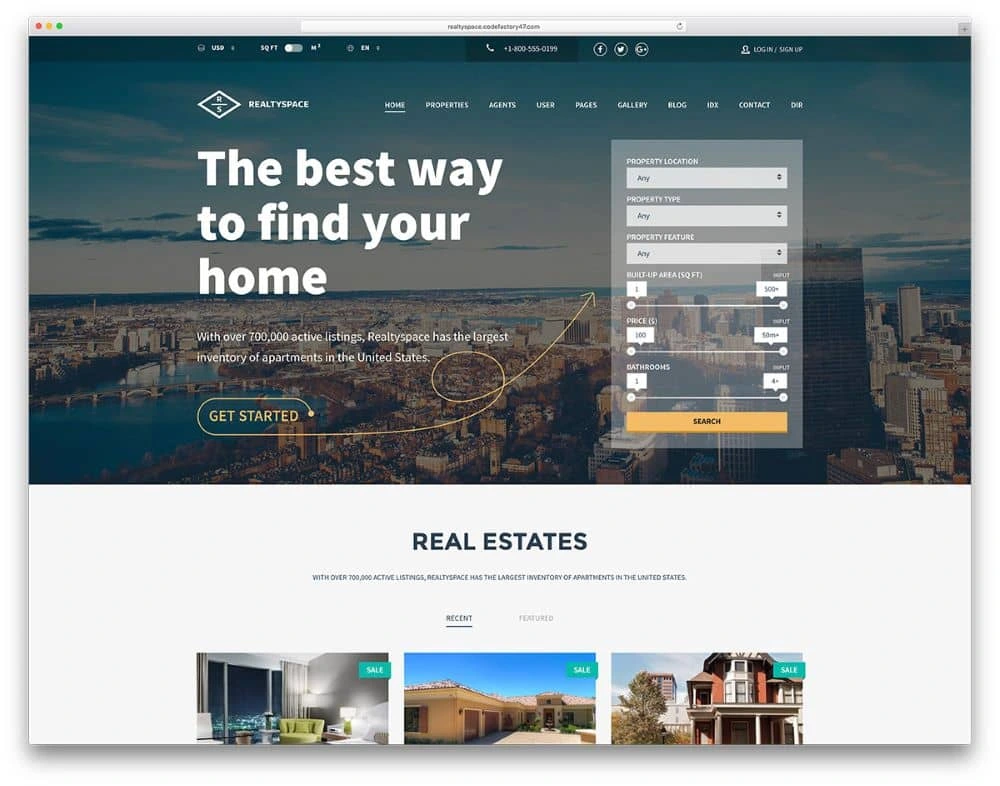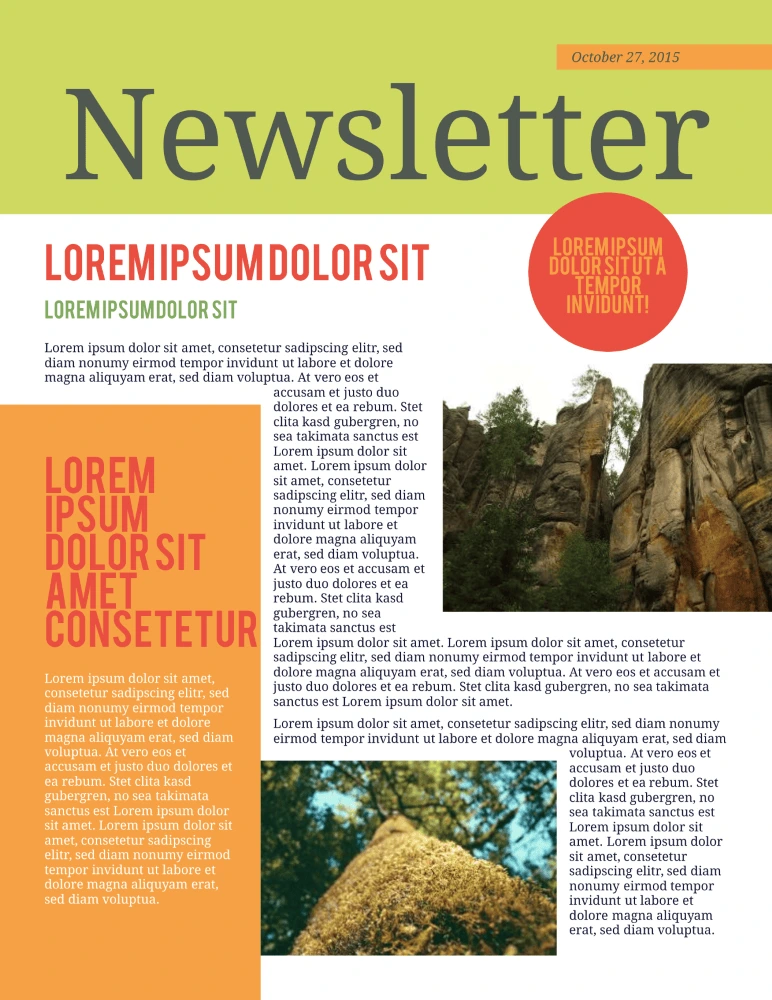Since 2008, real estate has gone up by an incredible 11.4% and created a fantastic opportunity for real estate agents to sell more clients.
Millennials will quickly become over a quarter of the real estate market, and only 1% of those millennials didn’t search online while looking for a house. Just one percent.
Related: How to handle inbound real estate leads
The internet has forever changed the way real estate agents get leads for their business, and you’re definitely behind the curve if you haven’t optimized your website for lead generation.
How do you generate real estate leads online? In this guide, you’ll learn various methods for obtaining quality leads online and the secret to converting your website into a real estate marketing machine.
Let’s get started.
1. Social media
If you’re not a frequent user of social media, it’s time you got started. Most people have a Facebook account, and many are active users on Instagram as well.
Instagram in particular is a fantastic avenue for sharing high-quality images and videos of properties and advertising your latest content (e.g. blogs & newsletters) effectively. By engaging with different channels each day and adding value to others, you’ll begin building a devoted following online.
Lots of real estate agents don’t do social media because they lack time for it. But with tools like Buffer and Hootsuite at your disposal, you only need an hour to set up a whole week’s worth of posts. All that’s left is checking the comment threads and responding whenever you have a few seconds throughout the week.
Read more about social media for real estate: How to build a social media campaign for real estate
2. Website

Source: Colorlib
If optimized properly, your website could be the foundation for attracting real estate leads online. It gives you the ability to provide value to your target market and help them engage with your brand.
Many real estate agents make mistakes in this area, and your website is not the place to describe your greatness in detail. Make your copy about how you’ll add value and better the lives of your customers.
An easy way to check whether your website is focused on your target market is to count how many times your site uses the word “we.” Customer-focused websites will use the word “you” more often.
3. Newsletter

See more newsletter templates from Lucidpress
It’s always a good idea to keep your name top-of-mind, and a newsletter is a great way to do so. Newsletters can share real estate news, recent listings, and tips to deal with typical homeowner struggles—like preparing your house for the winter.
A newsletter is especially useful if your leads live in urban areas. Cities such as San Francisco, Los Angeles and Chicago are massive and busy, so it’s easy to miss out on events if you’re not paying attention. It’s also an excellent opportunity to inform subscribers about the latest news and events in their area.
Read more about newsletters: 13 best newsletter design ideas to inspire you
4. Blog
Blogging is one of the most popular and effective ways to generate leads online. But like any lead-generating tool, it has to provide great value to your target market. A blog post about the staff holiday party is not going to get the leads you want.
The best information to share with your target market is actionable. This could include topics like making a down payment, picking a lender, listing their home, and working with a real estate agent.
Free advice will grow your influence and make you a valuable resource—so when someone needs to sell or buy a house, they’ll think of you first.
Read more about blogging for real estate: How to use content marketing in real estate
5. SEO
The first page of search results has only ten slots. 33% of the people searching will click on the first result. 18% will go a step further and click on the second result. The further down the page you go, the fewer clicks there are—only 4.4% click on the sixth result.
That’s why every business wants to be on top. The lower you are, the harder it gets to attract your target market’s clicks.
The ideal SEO strategy is about finding the best keywords (and phrases) to target, then using them deliberately in your content to attract the customers you want. SEO powerhouse Moz has lots of free resources and tools to help you get started.
6. Video
If seeing is believing, then showing off the fantastic features of your properties is a surefire way to win converts—and there’s no better way to do that than with video.
Videos empower your potential clients to take a guided tour of your properties. They’ll be engaged by your content, but more importantly, they’ll be motivated to reach out for more information.
A video is far more than just a slick way to show off a property. On average, an online video converts 33% of leads. If you want a more captivating way to connect with your target market, video marketing is a great way to increase interest in your properties.
Read more about video marketing for real estate: How to create stellar videos for real estate listings
7. Influencer marketing
Connecting with others in your industry is always wise, and doing it online makes it easier than ever. You can share and amplify each other’s work through social media and comment on posts each of you publish.
Influencer marketing takes this one step further. It starts by figuring out who your target market is—specifically. Then, you can find influencers who are popular among the folks you want to target. By partnering with these influencers on advertising campaigns, you can reach wider audiences and attract more people to your brand.
Read more about influencer marketing in real estate: 5 influencer marketing strategies for real estate
8. Mobile optimization
Industry professionals often spend tons of time and money making sure their website is professional and easy to use… then forget to check how it looks on a smartphone or tablet.
Mobile search has surpassed desktop search, so it’s more important than ever that your website works with mobile devices. (Google is going as far as penalizing sites that haven’t created mobile-friendly layouts.)
Make the switch. Not just to protect your website from Google, but to impress customers who encounter your brand exclusively via mobile device. Aim for the same goals as your regular website: clear copy, attractive design and intuitive function.
Want to go even further with mobile? Read more about using mobile text messaging for real estate: 5 steps to build out your real estate mobile text messaging strategy
9. Referrals
When you start off as a real estate agent (or in any field, really), you won’t have a network. So, it’s up to you to build one.
As you begin to deal with customers, don’t forget to ask for referrals. Encourage them to share your name with others—make it easy and worthwhile for them to do so. Whether it’s to their friends, family or coworkers, advertising by word-of-mouth is powerful. People are more likely to follow recommendations from people they know than an anonymous review online.
10. Retargeting
Although we covered social media all the way at the beginning of this guide, we left out one element that deserves its own section: retargeting via Facebook ads.
Facebook ads are not a popular method of advertising in real estate circles, despite how high the ROI can be. Here, retargeting simply means that people who have shown interest in your brand will see your ad again. This “interest” is measured by actions such as reading your blog posts, clicking on one of your ads, or even signing up for your newsletter.
Your conversion rate will improve if you target people who want what you’re selling. People who are actively interacting with your brand are more likely to buy than those just scrolling through their feeds. Retargeting keeps your brand top-of-mind for the folks who matter most.
Key takeaway
Leads don’t just magically appear in your inbox. You need a strong lead-generating strategy that helps you cultivate interest in your brand and set you apart from the competition. These tips should get you on the right track to generating real estate leads online.



